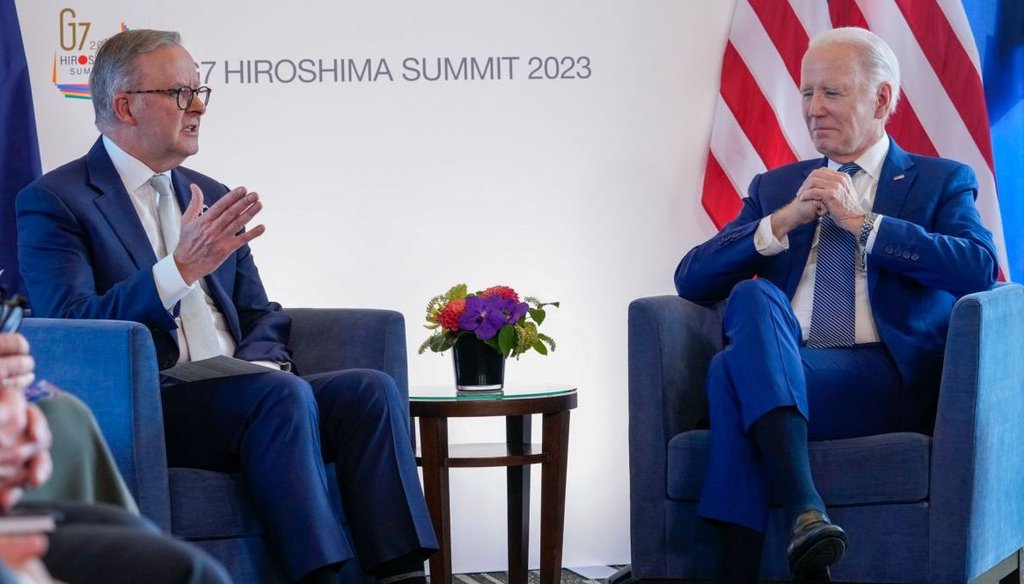

Our only agenda is to publish the truth so you can be an informed participant in democracy.
We need your help.


President Joe Biden, right, and Australian Prime Minister Anthony Albanese meet May 20, 2023, on the sidelines of the G7 Summit in Hiroshima, Japan. (AP)
• President Joe Biden has helped revitalize the four-nation group, and he’s involved the member nations’ leaders more directly in its work.
• However, Biden didn’t "form" the group. It dates back to the early 2000s, and after a period of dormancy, the effort was revived during Trump’s presidency.
During a trip to Asia for the G7 summit in May, President Joe Biden took credit for improving ties with three allies in the region: Australia, India and Japan. He specifically mentioned a four-nation partnership called the "Quad," whose members advocate for a rules-based order in the region, freedom of navigation and democratic values.
"I doubt many people in this audience or any other audience would have said that two years after being elected, I’d be able to convince India, Australia, Japan, and the United States to form an organization called the Quad to maintain stability in the Indian Ocean and the South China Sea," Biden said at a press conference May 21.
Soon though, critics, including an arm of the Republican National Committee, took to social media to say that Biden didn’t bring the "Quad" nations together.
The critics are right: Although Biden is credited with raising the Quad’s profile, the group was created in the early 2000s, and former President Donald Trump revived it from dormancy.
Joshua Kurlantzick, a senior fellow for Southeast Asia at the Council on Foreign Relations, a New York-based think tank, told PolitiFact that Biden’s statement about forming the group is "incorrect."
Although experts widely agree that Biden has worked to revitalize the Quad group, Kurlantzick said, "he didn't create the Quad," and the revitalization process did not start with him. "The Trump administration bulked up how the Quad was used and did a fair deal of revitalization."
The Quad began as an informal group to coordinate international responses to a major Indian Ocean tsunami in 2004. Over the next few years, Japan’s then-prime minister, Shinzo Abe, tried to formalize the group as the Quadrilateral Security Dialogue. In 2007, representatives of the four nations met at an annual Asia-Pacific forum and, along with Singapore, joined in periodic naval exercises held by the United States and India.
But the group foundered when Australia’s new prime minister, Kevin Rudd, pulled his country out and when Abe, the group’s champion, resigned as Japan’s prime minister. Beyond the leadership changes, though, a fear of alienating China’s authoritarian government was considered a leading cause of the Quad’s demise.
The Quad "raised hackles in Beijing, where it was viewed as little more than a brazen attempt to contain China's power in the region," the Australian Financial Review reported in September 2007. "Abe's insistence on ‘values-based diplomacy’ and an arc of democracy in the region were beginning to grate" on China.
For about a decade, the Quad languished. But under Trump, who was in office from 2017 to 2021, the U.S. government began to reinvigorate the group.
"Revitalization of the group began in 2017 and has accelerated since 2020," the nonpartisan Congressional Research Service wrote in January.
The Congressional Research Service credits Biden with having "boosted the profile" of the Quad and continuing the revitalization that began under Trump. In 2020, Australia was added to joint naval exercises with the other members.
The research service cites several events during Biden’s tenure, including:
• A September 2021 virtual summit that focused on coronavirus vaccine production, climate change, government transparency and regional infrastructure projects.
• A May 2022 summit that announced the establishment of a new partnership to track vessels involved in illegal fishing. Australian Prime Minister Anthony Albanese attended that meeting in Tokyo just hours after he was sworn in.
• The meeting in May, which was moved from Sydney to the G7 in Hiroshima, Japan, after Biden had to cancel his trip to other parts of Asia amid U.S. debt limit negotiations.
The White House told PolitiFact that Biden wasn’t referring to the Quad’s creation. Instead, he was highlighting his administration’s efforts to focus the Quad on regular leader-level meetings, which had not been held before 2021.
Biden said he was "able to convince India, Australia, Japan, and the United States to form an organization called the Quad to maintain stability in the Indian Ocean and the South China Sea."
Biden has helped revitalize the Quad, and he’s involved the member nations’ leaders more directly in its work. But he didn’t "form" the group; it dates back to the early 2000s, and after a period of dormancy, the effort was revived during Trump’s presidency.
Biden’s claim gives the incorrect impression that he started the group. However, the White House later said he was focusing on bolstering consistent leader-level meetings among the four countries.
The statement contains an element of truth but ignores critical facts that would give a different impression. We rate it Mostly False.
White House, "Remarks by President Biden in a Press Conference in Hiroshima, Japan," May 21, 2023
RNC Research, tweet, May 21, 2023
Congressional Research Service, "The 'Quad': Cooperation Among the United States, Japan, India, and Australia," Jan. 30, 2023
Bloomberg, "What Is the ‘Quad’ Alliance and Why Doesn’t China Like It?" May 17, 2023
Australian Financial Review, "Fukuda strikes the right note with Beijing; China observed," Sept. 18, 2007 (accessed via Nexis)
Snopes.com, "Did Biden Start the ‘Quad’ Strategic Alliance with India, Japan, and Australia?" May 22, 2023
Email interview with Joshua Kurlantzick, senior fellow for Southeast Asia at the Council on Foreign Relations, May 25, 2023
In a world of wild talk and fake news, help us stand up for the facts.
